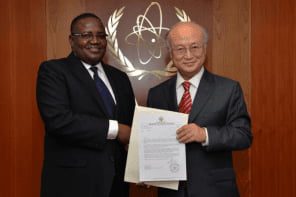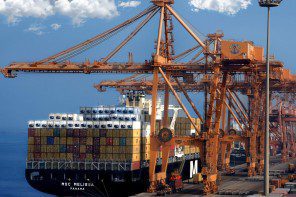1320 MW Rampal Power Project : A platform for Indo-Bangla cooperation faces major challenges
Following the issuance of the Joint Communiqué on the occasion of the Prime Minister Sheikh Hasina’s visit to India in January 2010, Bangladesh Power Development Board (BPDB) and National Thermal Power Corporation (NTPC) of India signed a Contract on 29 January 2012 to build under Joint venture the 1320 MW Rampal Coal Fired Power Plant at Bagerhat. Rampal power plant is considered as Bangladesh-India Friendship Power project and it promises to be the largest power plant in Bangladesh to be built on 1,834 acres of land, located 14-km north of the Sundarbans, the world’s largest mangrove forest.
The Rampal Power Project was estimated to involve USD 1.5 billion capital cost 70% of which was planned to arrange through costly ‘buyer’s credit’ and the balance was planned to equally shared by the JV partners. Under the 50 : 50 Joint Venture deal a JV Company was floated to install and operate the plant within the framework of BPDB and NTPC. BPDB Chairman and his counterpart at NTPC were very optimistic to deliver power from the Rampal power plant within 2015. India’s Power Secretary Uma Shankar stated that the deal opened up a ‘great platform’ for better cooperation between the two neighbours. There are differences of opinions on the project’s proposed financing and operation modalities. Buyer’s credit financing system will involve the selected contractor to arrange required external finance for the project. It is apprehended that the ‘buyer’s credit’ option for Rampal project implementation was accepted hastily by powerful officials who sensed lack of interest of international development partners to finance the project. On the contrary, BPDB and NTPC decision makers are less encouraged by the traditional development partner’s interests for financing and buyer’s credit was opted as an alternative. But present revised date (authorities concerned in Bangladesh expects now the Rampal Power plant project be completed in 2016) gave some space for sourcing and negotiations with multilateral development partners for softer term loans for better protecting the interest of the country and electricity consumers. Rapid growth of electricity tariff within a very short spell of time has already shaken the consumers in Bangladesh. Buyer’s credit based rigid term loan for a major power plant like Rampal plant will push the electricity cost further and might affect the viability of the project. The proposed Rampal coal fired power plant project was initiated with only conceptual study basis and the issues of coal supply and cost of power production, investment realities, and environmental issues came later.
Read also: NON-TARIFF BARRIERS TO INDIA-BANGLADESH TRADE EXPLAINED
In the meantime, land development works on the bank of Moidara canal in Rampal Upazila of Bagerhat district near the mangrove forest Sundarban was initiated by BPDB as part of the project implementation. Local and national level environmental activist groups raised voices against the project and a public interest writ petition was filed by the organization called ‘Save the Sundarban’. The environmental groups have started campaign against the proposed power plant project, fearing that it would be a serious blow to the ecology and environment for the world heritage site, the Sundarbans. The main opposition BNP expressed its solidarity with the environmental activists against the JV for Rampal coal fired power plant project. BPDB is still to carry out credible studies on the environmental and social impacts and their management strategies. So far BPDB claims that it plans to install super critical highly efficient boilers with necessary scrubbers to prevent pollution within acceptable limits. The advanced technology will keep the adverse environmental impacts controlled. But BPDB’s generic statement failed to neutralize the concerns of the environment groups.
The environment activists claim that the Rampal Power Plant authority did not bother to obtain Environmental Clearance from the Department of Environment as per prevailing regulations so far. The Honorable High Court bench asked the government to explain why filling up of lands on the bank of Moidara canal in Rampal Upazila for the project for setting up of the coal fired power plant would not be declared illegal. Media further reports that there has been very little physical progress for the Rampal Power Plant project in real term and power sector specialists fear that the project might not be completed within next five years. Already the 2015 dateline is revised as the fundamental issues including project financing, source and supply of coal and Power purchase agreement for developing the 1320 MW coal fired power plant at Rampal, Bagerhat remain open so far.
With the time passing the project costs will increase further. BPDB and NTPC need to agree on many other important issues for project implementation. As reported, Power Grid Company of Bangladesh (PGCB) is expected to install the transmission lines for facilitating power evacuation from the proposed power plant at Rampal. BPDB wanted that PGCB to become partner to the project, but NTPC disagreed with the proposal. BPDB is in favour of 25 year power purchase agreement and wishes to set a formula for power tariff setting. But NTPC favours power tariff fixing every year.
BPDB Chairman had no definite information about power generation cost per unit while asked after signing the Contract with NTPC. He preferred to say that the variables including plant cost, contractors cost for building the plant, interest rates and cost of financing, coal import costs will determine the per unit power generation costs. Various sources indicated that BPDB expected BDT 5.90 per unit power cost if the coal is supplied at USD 105/tonne; In case the coal will cost USD 145 per tonne the power generation cost will increase to BDT 8.85 per unit. It may be mentioned that Barapukuria coal fired power plant generates power at a cost of BDT 5.00 per unit (Barapukuria coal fired power plant receives coal supply from the adjacent Barapukuria Coal Mine at a rate of USD 105/tonne). BPDB signed a contract with Orion Group with a power tariff of BDT 3.88 per unit of power with import based coal fired power plants to be build at Khulna. Prime Minister’s Energy Adviser suggests for getting people ready to pay the cost for electricity. He believes that wastage of electricity will be reduced if electricity is purchased at a higher rate.
The proposed Rampal coal fired power plant will require annually approximately 4.5 million tonne of coal to generate 1320 MW electric energy. There is no required infrastructure for importing the necessary volume of coal at the plant site at present. BPDB intends to build a dedicated jetty for coal handling near the plant site. But the Moidara canal and its connecting rivers lack necessary draft for all season river transportation facilities. The Mongla port channel has a maximum 4 meter draft which restricts the large size barges to navigate. Bangladesh government appointed consultant CEGIS, a trust under Water Resources Ministry indicated the need for capital dredging from Akram Point of the confluence of the Bay of Bengal to the Rampal project site as well as for regular maintenance dredging of the rivers and canals connecting the Rampal Power Plant site to take advantage of coal transportation using ocean going vessels and to keep the coal transportation costs feasible. The primary estimate of CEGIS suggests that USD 105 million would be required for the capital dredging for facilitating the coal transportation for the proposed Rampal Power plant. In addition the route will have to be maintained with regular maintenance dredging annually with an estimated cost of USD 30 million per year. CEGIS further suggested that long term coal purchase and supply arrangements would be required for uninterrupted operation of the power plant. In that case the potential coal supply source could be Australia, South Africa or Indonesia. The quality coal import will be costly as the primary estimate indicates minimum cost for coal per tonne USD 145 plus USD 27 freight charges to apply for importing coal from the nearest Indonesian sources. This means the fuel cost per unit of power generation will be almost BDT 6 per unit. In case coal is to be imported from South Africa, the per tonne cost of coal will be USD 160 plus transportation cost of USD 39 per tonne. Australian coal will be costlier. The operation and maintenance cost of power generation at BPDB’s Barapukuria coal fired power plant is BDT 1.3 per unit. Therefore, Rampal Power Plant will hardly be able to deliver power at a price less than BDT 7 per unit.
It is obvious that the proposed Rampal coal fired power plant has several issues to address before the plant contraction starts. BPDB and the Power Division officials made several visits to India to discuss further the ways for speedy implementation of the project as BPDB put a lot of hope for commissioning of the base load power plant project to help ease the acute power shortages in Bangladesh. But there are skeptics who consider the project is not viable. The authorities concerned so far ignore such skepticism and show determination to go ahead with the project. Energy and Power sector decision makers are less concerned about the environmental activists move. The physical development concerning the Rampal Power Plant works indicate that the power plant project will unlikely be implemented within the revised time schedule; rather it will be delayed further. That implies unmet promises for replacing costly oil based power generated mainly from the rental and quick rental power plants with cheaper baseload power. Delays in implementing a major baseload power plant like the Rampal coal fired 1320 MW power plant show unprepared moves from the BPDB end and its limitation to understand coal supply chain, infrastructure requirements for coal import and their costs. Such an assessment is echoed by Prime Minister Sheikh Hasina’s Energy and Mineral Resources adviser Dr. Tawfiq E Elahi Chowdhury. He informed, ‘we have not taken any project like this. So it is taking some time. This is normal !’
The writer is a Mining Engineer. E-mail :mushfiq41@yahoo.com






